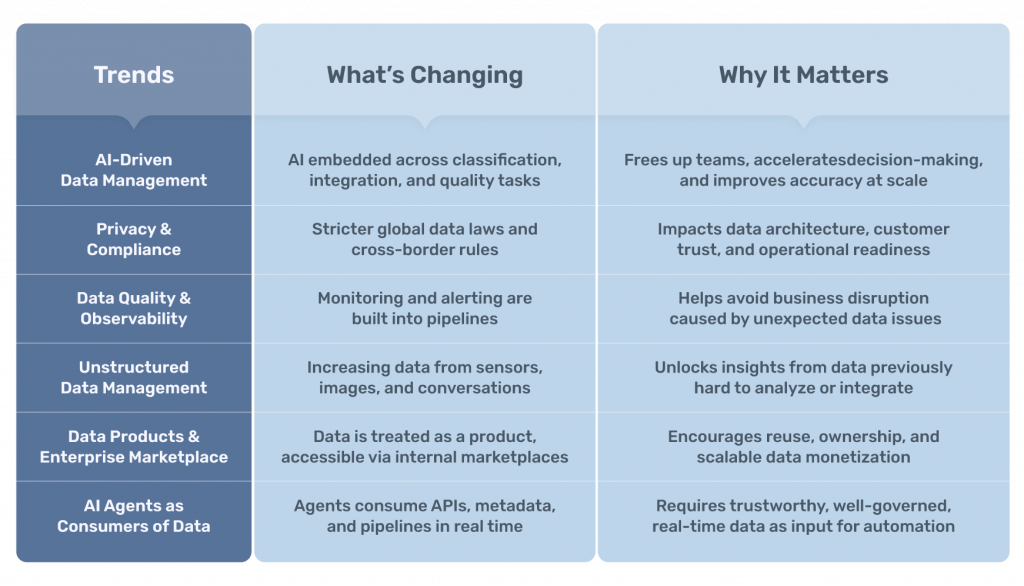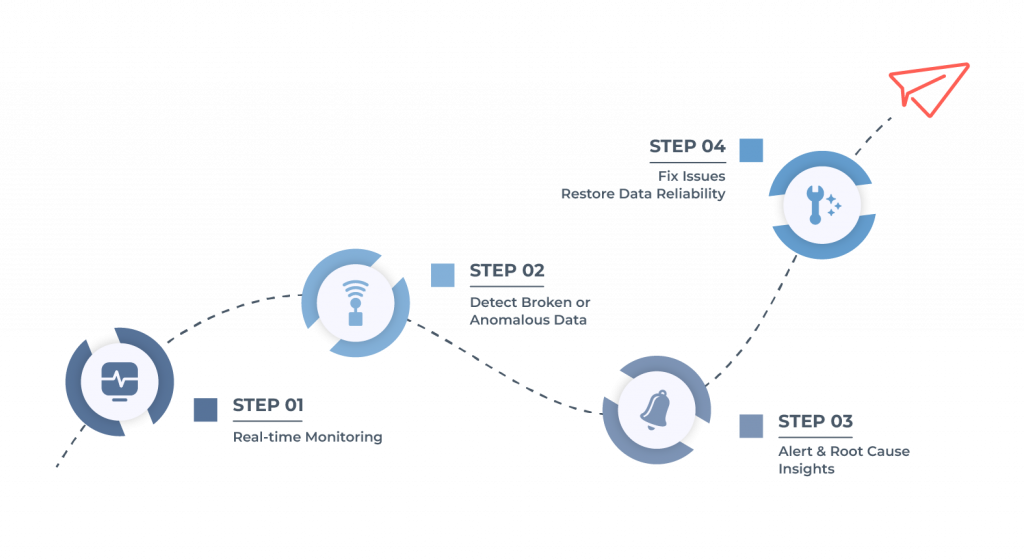In 2025, data management will have a direct impact on business growth, compliance, customer experience, and innovation. As AI matures and regulations become tighter, organizations should be aware of data management trends to reassess their data strategies.
According to Gartner, by 2025, 60% of data management tasks will be automated, making room for strategic oversight rather than routine firefighting.
While automation and tooling continue to evolve, the organizations that lead the market use data observability to gain clarity, control, and speed across all business units.
Executive Snapshot: Data Management Trends to Watch in 2025

1. AI Is Reshaping Data Management
AI is now deeply into daily workflows, including categorizing data, detecting anomalies, enriching metadata, and resolving data quality issues.
With data flowing in from cloud apps, APIs, and external vendors, it’s becoming increasingly essential to automate how we interpret and make data usable. AI-driven platforms support this by reducing manual cleanup, enhancing lineage tracking, and enabling faster decisions across business units.
For instance, a global logistics provider improved delivery route optimization by integrating AI into their data integration workflows.
Many leaders are also applying predictive analytics to anticipate trends, reduce risk, and allocate resources more effectively.
2. Privacy and Compliance Are Business Priorities
As regulations expand across geographies, organizations must rethink how and where they store and process data. Rules around data residency, consent, and cross-border transfer now influence architecture, vendor choices, and internal processes.
Fines related to data privacy violations have increased year after year, urging companies to take proactive measures.
Privacy programs are becoming a core part of strategy. More than a checklist for legal, it affects how you build products, how AI models behave, and how customers engage with digital services. Executives must ensure transparency and trustworthiness in every layer of their data stack.
3. Data Quality & Observability Are Foundational for AI
Trust in AI starts with confidence in data. Data quality is a foundational element for AI rollouts now.
Real-time observability of pipelines helps teams detect and fix broken data, schema mismatches, missing records, and volume spikes before they impact reports or models.
Inconsistent data freshness remains one of the top reasons executives mistrust dashboards. With observability, organizations can ensure speed, ownership, and confidence in every data-driven decision

4. Unstructured Data Management Unlocks New Insights
Enterprises are capturing more unstructured data than ever. For example, take IoT sensors, chat logs, social media, images, and videos.
Managing and analyzing this data is no longer optional. Teams are using AI to process and extract value from it, enabling use cases in fraud detection, customer sentiment, and process automation.
Modern data platforms must support the indexing, tagging, and searching of unstructured data to ensure it’s accessible and useful across departments.
5. Data Products and Internal Marketplaces Promote Reusability
Leading enterprises are now treating data as a product. That means creating well-documented, trusted, and reusable datasets to share across teams via internal marketplaces.
This model improves data discoverability, enforces ownership, and accelerates innovation without redundant data prep efforts.
Data products come with SLAs, metadata, and usage guidelines, ensuring everyone knows what they’re consuming and how to use it responsibly.
6. AI Agents as Data Consumers Need Real-Time Access
AI agents are emerging as internal automation tools that rely on real-time data to act, generate responses, or trigger workflows.
To enable this, organizations must provide high-quality, governed, and timely data streams. These agents don’t just read dashboards; they consume APIs, logs, and structured + unstructured data directly.
Building infrastructure that supports agent-friendly data consumption is a new frontier in scaling AI.
Positioning Your Organization for 2025
If you’re shaping your 2025 roadmap, check this:
A Future-Ready Data Strategy Starts With the Right Questions
If you’re shaping your 2025 roadmap, ask:
- Do your teams align on what “quality” means in data?
- Can your infrastructure support region-specific regulations and AI workloads?
- Do business users have the tools and context to work with data independently?
- Are potential risks in your data pipelines visible early enough to act on?
Answering these questions is strategic. Getting it right has a measurable impact on everything from customer retention to revenue forecasting.
How Qualdo-DRX Supports Data-Centric Teams
Data issues often hide behind missed KPIs, broken dashboards, or inaccurate machine learning models. Qualdo-DRX prevents this with a clear view of data health across your platforms.
It tracks quality, reliability, and pipeline stability across every layer of your stack. Teams can move faster and trust what they’re working with.
For modern data teams, Qualdo-DRX integrates easily into Azure, hybrid, and multi-cloud environments, supporting your path toward resilient, AI-ready data operations.



